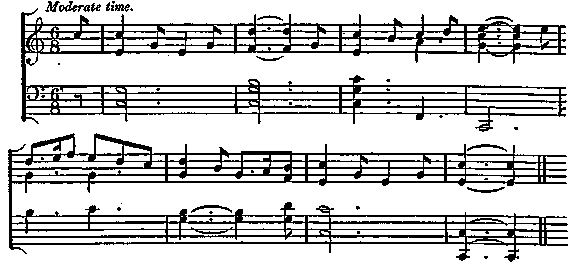Popular Music Of The Olden Time Vol 1
Ancient Songs, Ballads, & Dance Tunes, Sheet Music & Lyrics - online book
| Share page | Visit Us On FB |
|
REIGN OF ELIZABETH. |
193 |
|||
|
PUT ON THY SMOCK ON MONDAY. This is mentioned as a country dance tune in Heywood's A Woman MlVd with Kindness, act i., sc. 2; and alluded to in Fletcher's Love's Cure, act ii., sc. 2. It is contained in the fourth, fifth, and later editions of The Dancing Master. |
||||
|
|
||||
 |
||||
|
|
||||
|
DRIVE THE COLD WINTER AWAY. |
||||
|
|
||||
|
This is the burden of a song in praise of Christmas, copies of which are in the Pepys (i. 186) and Roxburghe (i. 24) Collections. It is entitled " A pleasant countrey new ditty: merrily shewing how to drive the cold winter away. To. the tune of Wfien Phosbus did rest"a &c.; black-letter, printed by H[enry] G[osson], It is one of those parodied in Andro Hart's Compendium of Qodly Songs. " The wind blawis cald, furious and bald,-
ThiB lang and mony a day ; But, Christ's mercy, we mon all die,
Or keep the cald wind away. This wind sa keine, that I of meine,
It is the vyce of auld; Our faith is inclusit, and plainely abusit, This wind he's blawin too cald," &c.
Scottish Poems qflGth Century, ii. 177, 8vo., 1801. The tune is in every edition of The Dancing Master; in Musictfs Delight on the Cithren, 1666; and in Walsh's Dancing Master: also in both editions of Pills to purge Melancholy, with an abbreviated copy of the words.
In the Roxburghe Collection, i. 518, is a ballad entitled " Hang pinching; or The good fellow's observation 'mongst a jovial crew, of them that hate flinching, but are always true blue. To the tune of Drive the cold winter away" commencing— " All you that lay claim to a good fellow's name, And yet do not prove yourselves so, Give ear to this thing, the which I will sing, Wherein I most plainly will shew |
||||
|
|
||||
|
* A song beginning " When Phcebus addral his course to the West," will be found in Merry Drollery Complete, Part ii., 1661; also in Wit and Drollery, Jovial Poems. The burden js, *' O do not, do not kill me yet, for I am |
not prepared to die." By that name it is quoted in J. Starter's Boertighedcn, quarto, Amsterdam, 1634, where the tune is also printed. |
|||